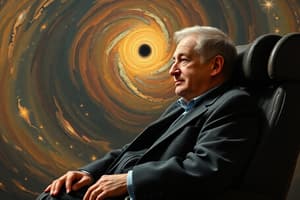Podcast
Questions and Answers
What significant event involving black holes did Hawking predict in 1974?
What significant event involving black holes did Hawking predict in 1974?
- Black holes emit heat and eventually evaporate. (correct)
- Black holes are permanent cosmic structures.
- Black holes can absorb all forms of light.
- Black holes can be created by neutron stars.
What aspect of the universe's beginning did Hawking explore in his research?
What aspect of the universe's beginning did Hawking explore in his research?
- The universe has always existed in a static form.
- The universe began from nothing with a single explosion.
- The universe was created by a collapsing star.
- The universe's beginning process could run in reverse. (correct)
What communication method did Hawking use after losing his voice in 1985?
What communication method did Hawking use after losing his voice in 1985?
- Written text only
- A computer linked to a speech synthesizer (correct)
- In-person interpretation
- Sign language
In what year did Hawking become the Cambridge's Lucasion Professor of Mathematics?
In what year did Hawking become the Cambridge's Lucasion Professor of Mathematics?
Which term was coined in 1967, relating to black holes?
Which term was coined in 1967, relating to black holes?
What was the primary focus of Hawking's PhD thesis?
What was the primary focus of Hawking's PhD thesis?
What was the primary achievement of Hawking's bestseller, A Brief History of Time?
What was the primary achievement of Hawking's bestseller, A Brief History of Time?
What role did Roger Penrose play in Hawking's work on the universe's beginnings?
What role did Roger Penrose play in Hawking's work on the universe's beginnings?
Flashcards
Stephen Hawking's field
Stephen Hawking's field
Theoretical Physics, focusing on cosmology and black holes.
Black Holes
Black Holes
Regions of spacetime with gravity so strong that nothing, not even light, can escape.
Hawking's Impact
Hawking's Impact
Popularized scientific ideas about the universe, making complex concepts accessible to the public
ALS diagnosis
ALS diagnosis
Signup and view all the flashcards
'A Brief History of Time'
'A Brief History of Time'
Signup and view all the flashcards
Hawking's Communication
Hawking's Communication
Signup and view all the flashcards
Black Hole Singularity
Black Hole Singularity
Signup and view all the flashcards
Hawking's prediction
Hawking's prediction
Signup and view all the flashcards
Study Notes
Stephen Hawking's Life and Work
- Hawking was a theoretical physicist known for his work on black holes and the origins of the universe
- He was a gifted science popularizer, making complex ideas understandable to a wider audience
- Diagnosed with ALS in 1963, affecting his motor neurons and speech
- He used a computer and speech synthesizer to communicate
- Obtained a PhD from Cambridge University in 1966 focusing on the properties of expanding universes, arguing that the universe originated from a singularity
Black Holes
- The term "black hole" was coined in the 1960s, though speculated on earlier
- Theoretical prediction that matter falling into black holes generates X-rays
- Astronomers observed X-ray binaries (stars orbiting black holes), supporting the theory in 1964
- Hawking studied black holes, focusing on their role in the early universe and their connection to the beginning
- He explored how black holes emit heat and eventually evaporate, a concept related to quantum theory and Einstein's general theory of relativity
- Hawking's work on black holes linked quantum theory to general relativity and challenged previous understandings
General Relativity and the Universe
- Hawking's work delves into the death and collapse of giant stars
- His theory proposes a "singularity," an infinitely dense and small point in space-time
- His understanding of the possible reversal of this process suggested the universe may have started in reverse of this process
Popularization of Science
- Hawking's "A Brief History of Time" (1988) became a popular science book, explaining complex theories to a broader audience
- This made the theories of the universe, past, present, and future accessible to nonspecialists
- The book was successful commercially and critically, reaching wide audiences
Studying That Suits You
Use AI to generate personalized quizzes and flashcards to suit your learning preferences.
Description
This quiz explores the life and contributions of Stephen Hawking, a renowned theoretical physicist celebrated for his groundbreaking work on black holes and the universe's origins. Delve into his unique communication methods and how he made complex scientific concepts accessible to all.





